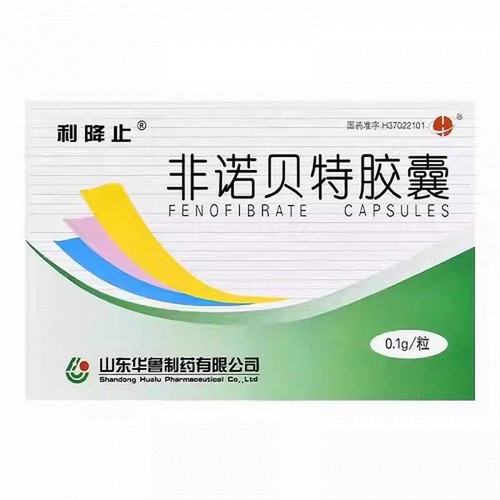Product Overview
[Drug Name]
Generic Name: Fenofibrate Capsules
Trade Name: Shumeng Fenofibrate Capsules 0.1g x 20 capsules
[Main Ingredients]
See package insert for details.
[Properties]
This product is a capsule containing a white or off-white crystalline powder.
[Indications/Main Functions]
It is used to treat hyperlipidemia in adults who have not responded well to dietary control therapy. It is more effective in lowering triglycerides and mixed hyperlipidemia than cholesterol. However, this product cannot completely replace dietary control therapy and should only be used as an adjunct to dietary control.
[Specifications]
0.1g x 20 capsules
[Dosage and Administration]
For adults, take 0.1g orally three times daily, with a maintenance dose of 0.1g once or twice daily. To reduce gastric discomfort, take with food. The dosage should be reduced in patients with renal insufficiency and the elderly. Discontinue the drug after two months of treatment if no effect is seen.
[Contraindications]
Fenofibrate is contraindicated in patients allergic to fenofibrate. It is also contraindicated in patients with a history of gallbladder disease or cholelithiasis. Fenofibrate capsules can increase cholesterol excretion into bile, leading to gallstones. It is also contraindicated in patients with severe renal insufficiency, hepatic insufficiency, primary biliary cirrhosis, or persistent liver dysfunction of unknown cause.
[Drug Interactions]
This product should be used with caution with HMG-CoA reductase inhibitors, such as pravastatin, fluvastatin, and simvastatin. This can cause myopathy, including myalgia, rhabdomyolysis, and elevated blood creatine phosphokinase. In severe cases, the drug should be discontinued. When fenofibrate capsules are used with bile acid-binding resins, such as cholestyramine, fenofibrate should be taken at least one hour before or four to six hours after these medications. Bile acid-binding drugs can also bind to other concurrent medications, potentially affecting their absorption. This product can enhance the efficacy of coumarin anticoagulants and may prolong the prothrombin time when used concomitantly. Therefore, the oral anticoagulant dose should be reduced when used concomitantly, and the dosage should be adjusted based on test results. This product is primarily excreted via the kidneys. When used concomitantly with immunosuppressants such as cyclosporine or other nephrotoxic drugs, there is a risk of worsening renal function, and the dose should be reduced or discontinued. When fenofibrate capsules are used concomitantly with other highly protein-bound drugs, such as tolbutamide and other sulfonylurea hypoglycemics, phenytoin, and furosemide, the free form of these drugs may increase, potentially enhancing their efficacy. If these drugs are taken during lipid-lowering therapy, the dosage of these and other hypoglycemic drugs should be adjusted.
[Precautions]
This product may interfere with diagnosis. Taking fenofibrate capsules may increase platelet count, blood urea nitrogen, aminotransferases, and serum calcium; and may decrease blood alkaline phosphatase, gamma-glutamyl transpeptidase, and bilirubin. During medication, regular checks should be performed: ① Complete blood picture and platelet count; ② Liver function tests; ③ Blood cholesterol, triglycerides, or low-density lipoprotein; ④ Blood creatine phosphokinase. If clinically suspected myopathy symptoms (such as myalgia, tenderness, fatigue, etc.) or a significant elevation in blood creatine phosphokinase are present, medication should be discontinued. While treating hyperlipidemia, it is also important to monitor and treat underlying conditions that can cause hyperlipidemia, such as hypothyroidism and diabetes. Certain medications, such as estrogens, thiazide diuretics, and beta-blockers, can also cause hyperlipidemia. After discontinuation of these medications, corresponding anti-hyperlipidemic treatment is no longer necessary. Dietary therapy remains the primary treatment for hyperlipidemia, and combined with exercise and weight loss, it is superior to any form of drug therapy.








